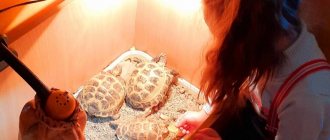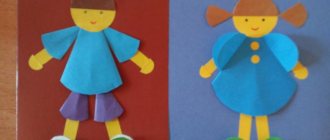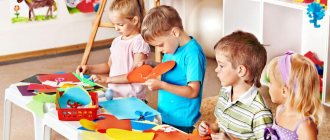Working with parents. Requirements for the design of a corner for parents
Larisa Sedova
Working with parents. Requirements for the design of a corner for parents
Requirements for the design of a corner for parents
• Information posted on the stand for parents should be dynamic. The material should be updated at least once every two weeks.
• When placing any printed material at the stand (medical advice, psychologist, etc.), a link to the publication. Including authorship and year of publication is required.
• The stand must be colorfully decorated. When decorating a stand, you should use not only hand-written drawings and inscriptions, but also posters and photographs (preferably children of the group and parents). When designing stands, there is no need to overuse decorative elements, naive images of nesting dolls and toys.
The ratio of text and illustrations in folders should be approximately 2:6 (2 parts - text, 6 - illustrations); they must first of all attract the attention of parents, then convey the necessary information to them
• Reserve should be created for information sharing between groups.
Sections
1. The parent corner contains a tablet about the age characteristics of the children in your group. Throughout the year, the material is updated, including in turn the requirements for physical, mental, and moral. To Trudov. Aesthetic education of children. Features of children’s speech development, self-service skills, etc. (you can indicate what children should know by the middle of the year of study, by the end of the year, etc.)
2. “Our life goes on day by day.” The section presents materials about the past day in the form of drawings, crafts, topics that were analyzed in class (for example, “Today Seryozha asked why sugar is sweet, the lyrics of a song learned in class, the name of a piece of music listened to, a book read to children, etc. The material is constantly updated. It may contain the following appeals: “Mom, learn a tongue twister with me” (text), etc.
3. “Our parents advise” (arbitrary name). In this section, parents can make some proposal to other parents (for example, let’s take the children on an excursion, etc., share experiences (for example, preventing colds, etc.: teachers can also write down tips, referring to parents, from which they heard, information (a children’s book week is taking place in the exhibition hall), advice (possibly a culinary recipe), etc. The page can also be filled out at the request of the parents (for this a questionnaire is developed or an oral survey is conducted). The decision is made by the parent meeting .
4. “Children’s Rights” A section for parents, which contains a variety of information on the observance of children’s rights in a preschool institution, in the family, addresses and telephone numbers where you can turn for help, and official documents.
5. Age group mode. It is permanent, but one of the activities is scheduled during the year, for example
Walk: if a target, then on what date it is planned, preliminary work, task for parents. After a walk-impression for children, a photo montage, a “report from the walk,” children’s drawings and comments on them, etc. is possible.
Long-term role-playing game: when it started, roles, attributes, craft tasks. For example, we play hospital - we need gowns, bandages, gauze bandages, “medicine bottles”, boxes of pills, etc.; We play store - attributes for the store. If the plot is a fairy tale, the tasks change according to the plot of the game, recommendations are given: what to read to the children, what attributes are needed for the game.
This way, you don't just tell or ask parents to replenish your game supply, but show where and how it will be used by children.
Once a month you need to plan individual work with parents to prepare for the lesson.
6. Notice board. Only official information is placed on it (meeting, birth payment, etc.)
7. Menu. The menu can also be used for individual work with parents by making a second pocket in which parents and teachers can place original recipes for their “specialty dishes.”
For example, the kindergarten menu includes breakfast: Masha’s “Favorite Porridge.” S, Artyoma Sh, Styopa F)-manna.
Or lunch: pilaf (original pilaf recipes are included in parental advice).
8. Section for information about the classes of specialists (speech therapist).
Exercise: write down individual complexes (can be preventive, hardening, etc.) Prepared by a physical education instructor.
Music classes (prepared by the music director) - class repertoire, what works were listened to. You can offer a cassette for listening at home with an annotation of musical works.
9. A psychologist and a medical worker prepare materials for movement folders. Once a quarter it is possible to issue a special magazine for parents on a current topic. These magazines are loaned to individual families for one to two weeks. After parents have studied the material, a conversation is held with them on this issue.
In addition to the stand, it is good to have a cabinet or shelves for displaying crafts, drawings, as well as a table for newspapers and magazines
The purpose of the next form of visual propaganda - thematic exhibitions - is to supplement verbal information for parents with drawings, photographs, natural objects (samples of toys, gaming materials, artistic works, etc., made by the hands of children, parents, educators.
Thematic exhibitions are created both for the parent team of the entire kindergarten, and for parents of one group.
You can involve the parents themselves in their design: entrust the selection of material on a certain topic, find clippings from newspapers and magazines, make patterns for homemade toys. Parenting magazines allow parents to become more familiar with this or that parenting issue.
___ Supplement to the magazine “Preschool Education Management”)
“Working with parents in preschool educational institutions” pp. 52-59
Kindergarten "Zvezdochka"
- General provisions
1.1. This Regulation determines the procedure for familiarizing with the documents of the municipal government preschool educational institution of combined type kindergarten No. 5 “Zvezdochka” of the urban settlement “Workers’ Village of Okhotsk” of the Okhotsk municipal district of the Khabarovsk Territory (hereinafter referred to as the preschool educational institution) parents (legal representatives) of minor students, including entering the preschool educational institution.
1.2. This provision has been developed in accordance with clause 18 of part 1 of article 34 and part 2 of article 55 of the Federal Law “On Education in the Russian Federation” dated December 29, 2012 No. 273-FZ.
1.3. The terms used in this provision mean the following:
“local normative act” - a normative instruction adopted at the preschool educational institution level and regulating its internal activities;
“administrative act” is an order issued by the head of the institution, which records decisions on administrative and organizational issues of the activities of the preschool educational institution;
“student” is an individual who is mastering an educational program.
1.4. These Regulations have been developed in order to respect the legal rights of students (applicants) and their parents (legal representatives).
1.5. This Regulation is a local regulatory act of the institution (hereinafter referred to as the local regulatory act), regulating the organizational aspects of the activities of the preschool educational institution.
1.6. The main requirements for informing parents (legal representatives) of minor students (applicants) are:
reliability and completeness of information provision;
clarity in the presentation of information;
-convenience and accessibility of obtaining information; efficiency of information provision.
1.7. In order to familiarize parents (legal representatives) of minor students (applicants) with these Regulations, the preschool educational institution places it on the institution’s information stand and (or) on the official website of the institution on the Internet information and telecommunications network (hereinafter referred to as the preschool educational institution website).
2 Organization of familiarization with parents (legal representatives) of minors entering the institution
2.1. When admitting a minor entering an institution, the preschool educational institution is obliged to familiarize his parents (legal representatives) with the following documents: - rules of admission to the institution, the charter of the Institution, a license to carry out educational activities, an educational program for preschool education and other documents regulating the organization and implementation of educational activities, rights and responsibilities of students.
Copies of the documents specified in paragraph 1 of this section are posted on the information stand in the preschool educational institution and (or) on the institution’s website.
The information stand of the preschool educational institution contains information about the documents that must be submitted to the head for the admission of a minor entering the institution and about the deadlines for the head to receive these documents.
The fact that the parents (legal representatives) of a minor applicant are familiar with the rules of admission to the institution, including through the website of the preschool educational institution, is recorded in the application for admission and certified by the personal signature of the parents (legal representatives) of the minor applicant.
The fact that the parents (legal representatives) of a minor applicant, including through the website of the preschool educational institution, is familiarized with the license to carry out educational activities, the charter of the Institution, the educational program of preschool education and other documents regulating the organization and implementation of educational activities, the rights and obligations of students is recorded in education agreement and certified by the personal signature of the parents (legal representatives).
The signature of the parents (legal representatives) of the minor applicant also records consent to the processing of their personal data and the personal data of the applicant in the manner established by the legislation of the Russian Federation.
- Organization of familiarization of parents (legal representatives) of minor students in the institution
3.1. The preschool education institution introduces parents (legal representatives) of minor students to local regulations affecting the rights and legitimate interests of students, parents (legal representatives) of minor students, including administrative acts.
3.2. Local regulations affecting the rights and legitimate interests of students and their parents (legal representatives) are posted on the information stand in the Institution and (or) the Institution’s website.
3.3. If changes are made to local regulations that affect the rights and legitimate interests of students, parents (legal representatives) of minor students become familiar with the local regulations in the new edition within 10 (ten) working days. These documents in the new edition are also posted on the Institution’s website at the same time.
3.4. In cases where the administrative act relates to a small circle of parents (legal representatives) of minor students, it is advisable to issue familiarization visas directly on the document itself.
3.5. In the case where it is necessary to familiarize a large number of parents (legal representatives) of minor students with the administrative act, a separate sheet can be attached to it for issuing all the necessary familiarization visas (hereinafter referred to as the familiarization sheet). The familiarization sheet is an appendix to the administrative act.
- Familiarization of parents with regulatory documents regulating the educational process
4.1 The preschool educational institution provides the opportunity for parents (legal representatives) to become familiar with the progress and content of the educational process, the achievements of minor students, which are reflected in the following documents:
- curriculum for the current year;
- annual calendar educational schedule;
- daily routine;
- class schedule;
- models for organizing the educational process during the day;
- the content of sections of the main educational program;
- the work plan of the educational institution for the academic year;
- work program of groups, narrow specialists;
- monitoring child development. To obtain information, parents (legal representatives) are given the opportunity to use the following sources of information:
- Rights and responsibilities of parents (legal representatives) of minor students
5.1. Parents (legal representatives) of minor students, independently or through their representatives, have the right:
- contact teachers and the administration of the educational institution to clarify issues regarding the education of your child;
- send appeals to the governing bodies of the preschool educational institution regarding the application of disciplinary sanctions to employees who violate and (or) infringe on the rights of pupils, parents (legal representatives).
5.2. Such appeals are subject to mandatory consideration by the specified bodies with the involvement of parents (legal representatives) of the pupils:
- apply to the commission for resolving disputes between participants in educational relations;
- take part and express your opinion at parent meetings;
- take part in the work of the pedagogical council of an educational institution with the right of an advisory vote;
- get acquainted with the diagnostic results, attend classes with the permission of the administration of the educational institution and the consent of the teacher working with children;
- talk with teaching staff based on the results of activities with the child.
5.3. Parents (legal representatives) of pupils are obliged to:
- carefully study the documents provided to him;
- interact with employees of an educational institution on the basis of mutual respect and tact;
- when visiting an educational institution, comply with the requirements, orders of the administration and internal regulations, the requirements of local regulations that establish the schedule of students' classes, the procedure for regulating educational relations between the educational organization and parents (legal representatives).
- The procedure for the entry into force of the Regulations and the method of its publication
6.1. This Regulation comes into force from the moment of its approval by the head of the preschool educational institution. Changes made to the Regulations come into force in the same manner.
6.2. After approval of the Regulations or changes made to it, the text of the Regulations or amendments is posted on the official website of the preschool educational institution.
Be Sociable, Share!
- Tweet




